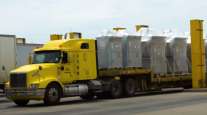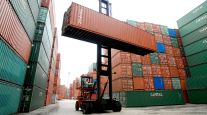Takeaway: Focus on Ports

Just as highway bottlenecks can impede the transport of goods over the road, congestion in and around the nation’s seaports can disrupt the supply chains of companies that import and export goods.
Not surprisingly, then, the American Association of Port Authorities projects that over the next five years $154.8 billion will be spent to expand, modernize and repair ports in the United States, more than three times the investment in the previous five-year period.
Much of that investment, nearly $130 billion, is expected to occur at ports along the U.S. Gulf Coast in response to a boom in construction of petrochemical processing plants in Texas and Louisiana and continued growth in exports of fuel, farm products and manufactured goods.
Some of money will go toward automation, although not all U.S. port operators are willing or able to invest the large sums necessary to acquire the heavy machinery needed to speed up loading and unloading of ships or to replace drayage trucks with driverless vehicles.
The response to congestion at some ports is to have shipping containers loaded directly onto railcars and taken to inland terminals where they can be loaded onto trucks and, in some cases, become a prime location for development of distribution centers and light manufacturing industries.
Another kind of investment that is reshaping the landscape of domestic and international transportation is e-commerce. In Chicago recently, Deutsche Post DHL Group announced plans to spend $137 million to build eight new distribution centers in the United States and expand existing operations in Los Angeles and Columbus, Ohio, to handle an increase in demand for international transportation of goods purchased online.
The promise of e-commerce is reflected in the 2016 Transport Topics Top 50 Global Freight Carriers list as well with FedEx Corp. moving ahead of rival UPS Inc. to reach No. 1 this year based on combined freight revenue of FedEx and TNT Express. FedEx’s acquisition of the Dutch package and freight delivery firm for $4.9 billion was one of four deals consummated over the past year that involved companies on the Top 50 Global Freight Carriers list.
“This acquisition marks the beginning of a new era,” FedEx Chairman Frederick Smith said in announcing completion of the transaction with TNT in May. “Adding TNT’s capabilities to our existing world-class suite of services . . . will further expand the ability of FedEx to support business connections around the world.”




